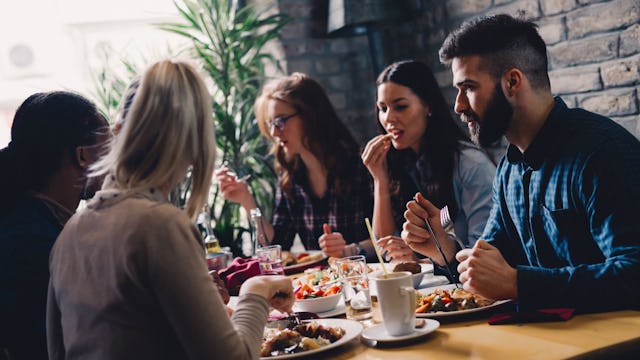Only Half Of Your Friends Actually Like You

As parents, it seems friendships are harder to maintain than ever. Even worse? A study from 2016 revealed that only about 50 percent of your friendships are actually real friends. That means half of the people you consider a friend probably don’t feel the same about you. Ouch.
The study, which was led by researchers from MIT, analyzed friendships of 84 classmates between the ages of 23 and 38. These participants were asked to rank their feelings for the others in the class on a scale of 0 to 5, with 0 being “I don’t know her,” 3 being “yeah, that’s my friend,” and 5 being “that’s my bestie.” After ranking each other, 94% of the participants said they expected their feelings to be reciprocated.
Spoiler alert: only 53 percent of them did. Burn.
GIPHY
“People don’t like to hear that the people they think of as friends don’t name them as friends,” said Alex Pentland, who is a computational social science researcher at M.I.T. He is also co-author of a study “Are You Your Friends’ Friend? Poor Perception of Friendship Ties Limits the Ability to Promote Behavioral Change,” which was published in the journal PLOS One.
Okay, so this study had a relatively small amount of participants — maybe it’s not as brutal as it sounds? I mean, how many of us considered our classmates to be our besties, after all?
Well, I hate to break it to you, but according to the New York Times, the study’s findings fall in line with previous studies conducted on the subject. In those studies, the number of participants hovered around 92,000. Within that number, the rate of reciprocity ranged between 34 and 54 percent. Pretty depressing numbers, if you ask me.
So what’s the deal? Why do only half of our “friends” consider us a friend?
Well, it starts in an interesting place. First, just trying to define the word “friend” is something that seems to stump everyone — even the experts who make it their jobs to study friendship patterns. Not to mention it became confusing AF when the word “friend” became a verb, thanks to social media.
Personally, I tend to use the word “friend” to describe someone who is more than just an acquaintance. I mean, it makes sense since starting a story with “so I was talking to this person I met at a party six years ago,” is kind of long winded. Once you get all of that out, you don’t even care about the story anymore. So I say friend as a placeholder.
When it’s someone I really consider a friend, I tend to use their name. For example, “my friend Sam,” is far more specific than just “my friend.” By using those kind of descriptors, it’s pretty clear that this isn’t just someone I met once or haven’t seen in 15 years.
GIPHY
“Treating friends like investments or commodities is anathema to the whole idea of friendship,” Ronald Sharp, an English professor who teaches a course on the literature of friendship at Vassar College, told the New York Times.
When you have hundreds of friends on social media, there is literally no way you’re actually taking the time to cultivate every single one of those relationships. It’s impossible. So it’s only natural that we pick and choose which relationships to put our time into and cultivate. That way we’re having meaningful relationships with a small amount of people rather than trying to spread ourselves thin trying to be friendly with a higher number of people.
This study only proves that when it comes to friends, it should always be quality over quantity. Robin Dunbar, a British anthropologist, led a study that found we only have room to cultivate a limited number of relationships — approximately 150 relationships, max, and only about five close friends.
“There is a limited amount of time and emotional capital we can distribute, so we only have five slots for the most intense type of relationship,” he also said to the Times. “People may say they have more than five, but you can be pretty sure they are not high-quality friendships.”
GIPHY
If you’re anything like me, now that you’ve been handed this eye opening info, you’re wondering which friends are the ones who don’t also consider you a friend. Eventually, those people will show themselves, or at least I’d like to hope they will.
The people who are truly your friends have likely already made it clear that they not only reciprocate your feelings, but do so with great willingness.
This article was originally published on